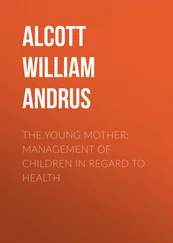William Alcott - The Young Man's Guide
Здесь есть возможность читать онлайн «William Alcott - The Young Man's Guide» — ознакомительный отрывок электронной книги совершенно бесплатно, а после прочтения отрывка купить полную версию. В некоторых случаях можно слушать аудио, скачать через торрент в формате fb2 и присутствует краткое содержание. Издательство: Иностранный паблик, Жанр: foreign_prose, foreign_religion, Философия, foreign_psychology, foreign_antique, на английском языке. Описание произведения, (предисловие) а так же отзывы посетителей доступны на портале библиотеки ЛибКат.
- Название:The Young Man's Guide
- Автор:
- Издательство:Иностранный паблик
- Жанр:
- Год:неизвестен
- ISBN:нет данных
- Рейтинг книги:5 / 5. Голосов: 1
-
Избранное:Добавить в избранное
- Отзывы:
-
Ваша оценка:
- 100
- 1
- 2
- 3
- 4
- 5
The Young Man's Guide: краткое содержание, описание и аннотация
Предлагаем к чтению аннотацию, описание, краткое содержание или предисловие (зависит от того, что написал сам автор книги «The Young Man's Guide»). Если вы не нашли необходимую информацию о книге — напишите в комментариях, мы постараемся отыскать её.
The Young Man's Guide — читать онлайн ознакомительный отрывок
Ниже представлен текст книги, разбитый по страницам. Система сохранения места последней прочитанной страницы, позволяет с удобством читать онлайн бесплатно книгу «The Young Man's Guide», без необходимости каждый раз заново искать на чём Вы остановились. Поставьте закладку, и сможете в любой момент перейти на страницу, на которой закончили чтение.
Интервал:
Закладка:
3. To lie snoring late in the morning, assimilates us to the most beastly of animals. Burgh, an ingenious English writer, justly observes; 'There is no time spent more stupidly than that which some luxurious people pass in a morning between sleeping and waking, after nature has been fully gratified. He who is awake may be doing something: he who is asleep, is receiving the refreshment necessary to fit him for action: but the hours spent in dozing and slumbering can hardly be called existence.'
The late Dr. Smith, of Yale College, in his lectures, used to urge on his hearers never to take ' the second nap .' He said that if this rule were steadily and universally followed by persons in health,—there would be no dozing or oversleeping. If, for once, they should awake from the first nap before nature was sufficiently restored, the next night would restore the proper balance. In laying this down as a rule, Dr. Smith would, of course, except those instances in which we are awakened by accident.
4. It has been remarked by experienced physicians that they have seldom, if ever, known a person of great age, who was not an early riser. In enumerating the causes of longevity, Rush and Sinclair both include early rising.
5. It is a trite but just maxim that one hour's sleep before midnight is worth two afterward. Why it is so, would perhaps be difficult to say. The power of habit is great, and as the majority of children are trained to go to bed early, perhaps this will in part account for the fact. So when the usual hour for meal arrives, a given amount of food eaten at the time, is digested in a more healthy and regular manner than if eaten one, or two, or three hours afterwards. Again, nature certainly intended man should exercise during the day, and sleep in the night. I do not say the whole night; because in the winter and in high northern latitudes, this would be devoting an unreasonable portion of time to sleep. It would hardly do to sleep three or four months. But in all countries, and in all climates, we should try to sleep half our hours before midnight.
6. The person who, instead of going to bed at nine, sits up till eleven, and then sleeps during two hours of daylight the following morning, is grossly negligent of economy. For, suppose he makes this his constant practice, during his whole business life, say fifty years. The extra oil or tallow which he would consume would not be estimated at less than one cent an evening; which, in fifty years would be $182.50. Not a very large sum to be sure; but, to every young man, worth saving; since, to a community of 1,000 young men, the amount would be no less than $182,500. Then the loss in health and strength would be far greater, though it is obvious that it cannot so easily be computed.
7. Once more. If an hour's sleep before midnight is worth more than an hour in the morning, then an hour in the morning is of course worth less than an hour before midnight, and a person must sleep a greater number of hours in the morning to obtain an equal amount of rest. A person retiring at eleven and rising at eight, would probably get no more rest, possibly less, than a person who should sleep from nine to five;—a period one hour shorter. But if so, he actually loses an hour of time a day. And you well know, if Franklin had not told you so, that time is money .
Now, if we estimate the value of this time at ten cents an hour for one person in four, of the population of the United States—and this is probably a fair estimate—the loss to an individual in a year, or 313 working days, would be $31.30; and in 50 years $1,565. A sum sufficient to buy a good farm in many parts of the country. The loss to a population equal to that of the United States, would, in fifty years, be no less than five thousand and eighty-six millions of dollars!
But this is not the whole loss. The time of the young and old is beyond all price for the purposes of mental and moral improvement. Especially is this true of the precious golden hours of the morning. Think, then, of the immense waste in a year! At twelve hours a day, more than a million of years of valuable time are wasted annually in the United States.
I have hitherto made my estimates on the supposition that we do not sleep too much, in the aggregate, and that the only loss sustained arises from the manner of procuring it . But suppose, once more, we sleep an hour too much daily. This involves a waste just twice as great as that which we have already estimated.
Do you startle at these estimates! It is proper that many of you should. You have misspent time enough. Awake your 'drowsy souls,' and shake off your stupid habits. Think of Napoleon breaking up the boundaries of kingdoms, and dethroning kings, and to accomplish these results, going through with an amount of mental and bodily labor that few constitutions would be equal to, with only four hours of sleep in the twenty-four . Think of Brougham too, who works as many hours, perhaps, as any man in England, and has as much influence, and yet sleeps as few; i.e., only four. A hundred persons might be named, and the list would include some of the greatest benefactors of their race, who never think of sleeping more than six hours a day. And yet many of you are scarcely contented with eight!
Would you conquer as Bonaparte did—not states, provinces, and empires,—but would you aspire to the high honor of conquering yourselves, and of extending your conquests intellectually and morally, you must take the necessary steps. The path is a plain one; requiring nothing but a little moral courage. 'What man has done, man may do.' I know you do not and ought not to aspire to conquer kingdoms, or to become prime ministers; but you ought to aspire to get the victory over yourselves:—a victory as much more noble than those of Napoleon, and Cæsar, and Alexander, as intellectual and moral influence are superior to mere brute force.
It was the opinion of a very eminent and observing man, that those who are obedient to parents, are more healthy, long lived, and happy than those who are disobedient. And he reasons very fairly on the subject.
Now I do not know whether the promise annexed to the fifth command, (whatever might have been intended, as addressed to the Jews,) has any special reference to happiness in this life. I only know that in general, those who are obedient to parents are apt to be virtuous in other respects; for the virtues as well as the vices usually go in companies. But that virtue in general tends to long life and happiness, nobody will entertain a doubt.
I am sorry, however, to find that the young, when they approach adult years, are apt to regard authority as irksome. It should not be so. So long as they remain under the parental roof, they ought to feel it a pleasure to conform to the wishes of the parents in all the arraignments of the family, if not absolutely unreasonable. And even in the latter case, it is my own opinion—and one which has not been hastily formed, either—that it would be better to submit, with cheerfulness; and for three reasons.
1st. For the sake of your own reputation; which will always be endangered by disobedience, however unjust the parental claim may be.
2d. From a love of your parents, and a sense of what you owe them for their kind care; together with a conviction that perfect rectitude is not to be expected. You will find error, more or less, every where around you—even in yourselves; why should you expect perfection in your parents?
3d. Because it is better to suffer wrong than to do wrong. Perhaps there is nothing which so improves human character, as suffering wrongfully; although the world may be slow to admit the principle. More than this; God himself has said a great deal about obedience to parents .
Читать дальшеИнтервал:
Закладка:
Похожие книги на «The Young Man's Guide»
Представляем Вашему вниманию похожие книги на «The Young Man's Guide» списком для выбора. Мы отобрали схожую по названию и смыслу литературу в надежде предоставить читателям больше вариантов отыскать новые, интересные, ещё непрочитанные произведения.
Обсуждение, отзывы о книге «The Young Man's Guide» и просто собственные мнения читателей. Оставьте ваши комментарии, напишите, что Вы думаете о произведении, его смысле или главных героях. Укажите что конкретно понравилось, а что нет, и почему Вы так считаете.












